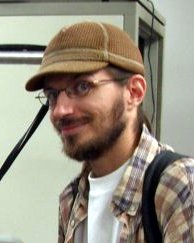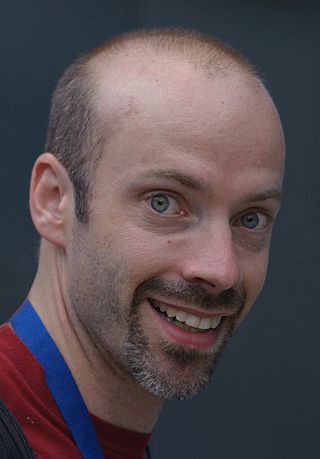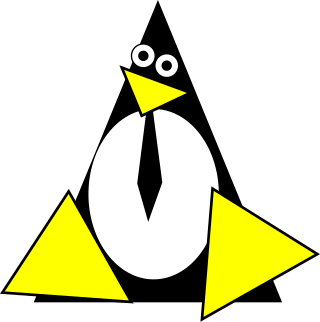
Bruce Perens is an American computer programmer and advocate in the free software movement. He created The Open Source Definition and published the first formal announcement and manifesto of open source. He co-founded the Open Source Initiative (OSI) with Eric S. Raymond.
The GNU C Library, commonly known as glibc, is the GNU Project's implementation of the C standard library. It is a wrapper around the system calls of the Linux kernel for application use. Despite its name, it now also directly supports C++. It was started in the 1980s by the Free Software Foundation (FSF) for the GNU operating system.

Linux Australia is the national, Australian Free and Open Source Software Community organisation. It was founded in 1997 and formally incorporated in New South Wales as a non-profit organisation in 1999. Linux Australia aims to represent Australian Free and Open Source Software communities and to support and collaborate with related groups, including Linux User Groups in Australia.

Bdale Garbee is an American computer specialist who works with Linux, particularly Debian. He is also an amateur radio hobbyist (KB0G), and a member of AMSAT, Tucson Amateur Packet Radio, and the American Radio Relay League.
DebConf, the Debian developers conference is the yearly conference where developers of the Debian operating system meet to discuss further development of the system.

LWN.net is a computing webzine with an emphasis on free software and software for Linux and other Unix-like operating systems. It consists of a weekly issue, separate stories which are published most days, and threaded discussion attached to every story. Most news published daily are short summaries of articles published elsewhere, and are free to all viewers. Original articles are usually published weekly on Thursdays and are available only to subscribers for two weeks, after which they become free as well. LWN.net is part of Eklektix, Inc.

David Stephen Miller is an American software developer working on the Linux kernel, where he is the primary maintainer of the networking subsystem and individual networking drivers, the SPARC implementation, and the IDE subsystem. With other people, he co-maintains the crypto API, KProbes, IPsec, and is also involved in other development work.

Greg Kroah-Hartman is a major Linux kernel developer. As of April 2013, he is the Linux kernel maintainer for the -stable branch, the staging subsystem, USB, driver core, debugfs, kref, kobject, and the sysfs kernel subsystems, Userspace I/O, and TTY layer. He also created linux-hotplug, the udev project, and the Linux Driver Project. He worked for Novell in the SUSE Labs division and, as of 1 February 2012, works at the Linux Foundation.

nouveau is a free and open-source graphics device driver for Nvidia video cards and the Tegra family of SoCs written by independent software engineers, with minor help from Nvidia employees.

Rusty Russell is an Australian free software programmer and advocate, known for his work on the Linux kernel's networking subsystem and the Filesystem Hierarchy Standard.

Jonathan Oxer is a computer programmer, Debian developer, author, entrepreneur, and Free Software activist. He lives in Melbourne, Australia with his wife and their two children.
The Linux Symposium was a Linux and Open Source conference held annually in Canada from 1999 to 2014. The conference was initially named Ottawa Linux Symposium and was held only in Ottawa, but was renamed after being held in other cities in Canada. Even after the name change, however, it was still referred to as OLS. The conference featured 100+ paper presentations, tutorials, birds of a feather sessions and mini summits on a wide range of topics. There were 650 attendees from 20+ countries in 2008.

Tux is a penguin character and the official brand character of the Linux kernel. Originally created as an entry to a Linux logo competition, Tux is the most commonly used icon for Linux, although different Linux distributions depict Tux in various styles. The character is used in many other Linux programs and as a general symbol of Linux.
nftables is a subsystem of the Linux kernel providing filtering and classification of network packets/datagrams/frames. It has been available since Linux kernel 3.13 released on 19 January 2014.
perf is a performance analyzing tool in Linux, available from Linux kernel version 2.6.31 in 2009. Userspace controlling utility, named perf, is accessed from the command line and provides a number of subcommands; it is capable of statistical profiling of the entire system.

Smack is a Linux kernel security module that protects data and process interaction from malicious manipulation using a set of custom mandatory access control (MAC) rules, with simplicity as its main design goal. It has been officially merged since the Linux 2.6.25 release, it was the main access control mechanism for the MeeGo mobile Operating System. It is also used to sandbox HTML5 web applications in the Tizen architecture, in the commercial Wind River Linux solutions for embedded device development, in Philips Digital TV products., and in Intel's Ostro OS for IoT devices.

Donna Benjamin is an Australian open source community contributor, commentator and advocate. She has served in board positions with community organisations including Open Source Industry Australia, Drupal Association and the Ada Initiative, and was the lead organiser of the 2008 linux.conf.au conference in Melbourne. She regularly runs the Community Leadership Summit X at LCA (clsXlca), a workshop focussing on community development in open source projects. In 2011 she organised a crowdfunding campaign called Digitise The Dawn, which successfully raised funds to digitise The Dawn, an early feminist journal published in Australia between 1888 and 1905.
This article documents the version history of the Linux kernel. The Linux kernel is a free and open-source, monolithic, Unix-like operating system kernel. It was conceived and created in 1991 by Linus Torvalds.
Russell Coker is an Australian computer programmer based in Melbourne. He has been actively involved in the free and open-source software community and is a long time Debian developer. He has also made contributions to Security-Enhanced Linux (SELinux) in the forms of creating reference policy and integrating SELinux to the wider free software ecosystem. In 2003, Coker was awarded a grant from the James and Charlotte Griffin Foundation for his work on SELinux.












